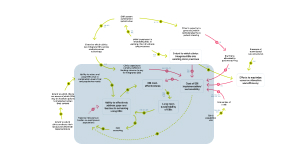How can EBI cost-effectiveness be maximized?
Especially in resource-limited settings, it is important for clinics to evaluate their resources prior to EBI implementation138, 139 to facilitate the awareness and subsequent selection of feasible EBIs.323, 334 Selecting feasible and effective EBIs increases a clinic’s ability to use EBIs to address gaps and barriers to screening, which increases CRC screening.
A balancing loop (B1) occurs because as more people get screened, the need to intervene on harder-to-reach populations increases. EBIs are less effective at increasing screening for the hard-to-reach population. There are increasing marginal costs associated with getting the harder-to-reach population screened as CRC screening rates rise.
Cited references for this diagram
However, most measures did not explicitly evaluate resources available as part of assessing capacity, a concept important in resource-limited settings, particularly FQHCs involved in the CRCCP.
Hohl SD, Melillo S, Vu TT, Escoffery C, DeGroff A, Schlueter D, Ross LW, Maxwell AE, Sharma KP, Boehm J, Joseph D, Hannon PA. Development of a Field Guide for Assessing Readiness to Implement Evidence-Based Cancer Screening Interventions in Primary Care Clinics. Prev Chronic Dis. 2022 May 12;19:E25. doi: 10.5888/pcd19.210395. PMID: 35550244; PMCID: PMC9109642.
Implementation readiness — an organization’s combined capacity, commitment, and willingness to implement a new program, policy, or practice — facilitates implementation success.[[16–18]] Because public health resources are limited, identifying a clinic’s readiness to successfully implement and sustain interventions, as well as gaps in clinic resources or practices that need to be addressed before implementation, is critical. Such assessment practices can guide clinics to select interventions with the greatest potential for long-term sustainability, and in turn help maximize the impact of public health spending, optimize clinic success, reduce cancer disparities, and improve population health.
Hohl SD, Melillo S, Vu TT, Escoffery C, DeGroff A, Schlueter D, Ross LW, Maxwell AE, Sharma KP, Boehm J, Joseph D, Hannon PA. Development of a Field Guide for Assessing Readiness to Implement Evidence-Based Cancer Screening Interventions in Primary Care Clinics. Prev Chronic Dis. 2022 May 12;19:E25. doi: 10.5888/pcd19.210395. PMID: 35550244; PMCID: PMC9109642.
The study findings support that clinics may choose to implement strategies best suited for their unique circumstances and availability of resources.
Sharma KP, DeGroff A, Maxwell AE, Cole AM, Escoffery NC, Hannon PA. Evidence-Based Interventions and Colorectal Cancer Screening Rates: The Colorectal Cancer Screening Program, 2015-2017. Am J Prev Med. 2021 Sep;61(3):402-409. doi: 10.1016/j.amepre.2021.03.002. Epub 2021 May 14. PMID: 33994253; PMCID: PMC11008572.
To determine appropriate EBIs and ensure clinic capacity to implement them, programs can conduct readiness assessments of clinics prior to implementation. However, clinics may lack resources to implement all available interventions, and may strategically choose EBIs that are less resource intensive.
Sharma KP, DeGroff A, Hohl SD, Maxwell AE, Escoffery NC, Sabatino SA, Joseph DA. Multi-component interventions and change in screening rates in primary care clinics in the Colorectal Cancer Control Program. Prev Med Rep. 2022 Jul 9;29:101904. doi: 10.1016/j.pmedr.2022.101904. PMID: 35864930; PMCID: PMC9294188.

